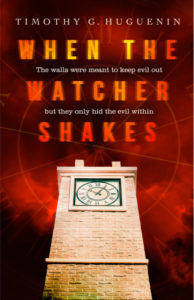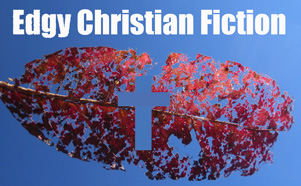 When The Watcher Shakes
When The Watcher Shakes
The walls were meant to keep evil out–but they only hid the evil within.
John has given up his ordinary life to find wisdom traveling the country and enjoy the freedom of living as a nomad. But when he stumbles across a mysterious town tucked away in the Appalachian Mountains, walled off from modern society, he discovers a group of people who could use some freedom of their own. Are they a harmless religious sect, or is there something less benign underneath the surface?
The townspeople are initially wary of their new visitor, but as John questions their way of life, some of them begin to have questions of their own. As the leadership’s tight control unravels, men and women break free from the chains of legalism–some literally, and some at the cost of their own lives.
Peter’s Review:
I was asked by the author a few months ago, to review this debut novel before it was released but was unable to due to my review schedule. I did add it to my personal To Be Read list for later reading. It was only when the author made it free that I decided to download it instead of buying when I planned to read it. Out of pure curiosity, I started to read the first page or two and I was hooked. I then decided to rearrange my entire weekend to reading it. I simply could not put this down. I realised what caused this and it is multifactorial.
First, it is the plot and the secluded setting. A pseudo Christian community (the word sect comes to mind) set in the mountains of West Virginia that is walled from the outside world with its own interpretation of living out the word of God and corrupted with man made rituals and extreme forms of punishment for sinning.
Second, the sense that all is not as it seems and that is something lurking in the background that keeps you wondering what this is or could be, and sometimes thinking “Where is the author going with this?”
Thirdly, how does all this affect John, the Outsider and how does John’s influence affect this community that has no idea of what the outside world is like except that they are indoctrinated that is is evil?
Fourth, it is Huguenin’s writing style. He writes well, it is crisp, to the point, specific and he describes the events really well. This transported me to this walled community, I could picture the town, the clean ordered streets, the behaviour and attitudes of the people in their interaction with each other and the air of deception, fear, oppression that hangs in the air.
Fifth, this novel is well constructed and everything fits together very nicely. Reads like a very finely tuned engine. Smooth, consistent, one event building onto the next. No peaks or troughs in the pace or plot.
For a debut novel, you would never know it. It seems that Huguenin has a combination of talent and good mentoring. One has only to read the Acknowledgements to see where some of this comes from. It has paid off exceptionally well for him. If this is the quality of his first novel, then I am very much looking forward to everything else coming from his pen in the future. He sets a high standard from the start.
I usually find novels where there is spiritual oppression and deception hard to read as it angers and frustrates me but in this novel, it was not the case. The way Huguenin constructed this is done well with enough intrigue and suspense to keep you wanting to find out more and to see what is behind this deception. However, as much as the author has constructed this deception based on abuse of the Word of God and the Letters and Journals of Abe, the Esteemed One, founder of this community, I would have appreciated more of what these Letters and Journals contained to explain the basis of this grand deception of this community and to back up the enforcing of the (legalistic) rules and regulations/rituals that the community live under. It would also have provided more of the background to this community and how it came to be like it is. This is not to say that the absence of this was a weakness of this novel, or where it falls short, just that it would have added more depth and credibility to the deception that Huguenin successfully develops.
Through all this, the author has done a great job of showing how abuse of power, distortion of the Truth, in this case the Word of God, and basing a government on a Pharisaic legalism style is evil, self serving, oppressive, demoralising and destructive. One characteristic of control of the masses in this system and is also characteristic of it being a cult, is to suppress, ban, block the masses from questioning the way things are, but to only concentrate on the what, the when, the where,
The people of Abestown did not care to speculate on the whys of any given topic, only the topic itself: the what, the when, the where. Rarely did they even concern themselves with the how. This was strange to Isaac, who had come to think that the why was the most intriguing, if not the most important, question to concern himself with.
This is the icing on the cake of oppression and deception, where the masses are not encouraged or taught to think for themselves or to question any element of their lives. This is epitome of control, power and its destructiveness. Huguenin does not just leave it there either, he shows what the consequences are in this deception and legalism when someone steps out of this mold and does question the order of things and it is this that adds more suspense and darkness to this novel.
Huguenin definitely shows what happens when a society is ruled on legalism and grace is totally absent. Jesus exposed the dangers of this and so did Paul in his Epistles. There is no balance between these two elements in this novel as there is in the Bible and in how Jesus taught us to live. Not sure if this is one of the messages Huguenin wanted to portray but it definitely stood out to me as I have seen this inbalance in some of the churches and behaviour of Christians over the years. Either extreme is just as destructive as the other.
When the control of the community began to get out of control and two main characters started to see the truth of this oppressive legalistic regime and rebel against it and its perpetrators, I would have expected these characters to have found the truth in the Gospel, seeing that their spirituality is based on this and they did know this but part of this oppressive regime enforced by the Head Historian and the Council of Historians was that the Bible was not encouraged to be read or studied by the community and instead the Council and Head Historian were the ones that interpreted and instructed them in it, albeit a corrupted interpretation, that further supported the legalistic regime. Very much reminds me of the denomination of the church of my youth. However, I would have loved to have seen this community find the salvation and freedom found in the true Gospel message and show the power of this Gospel unto salvation. This would have made a great ending or epilogue.
I really liked this novel and I look forward to more from this author. I feel he is one to watch. He has made a great debut with this novel for all the reasons I have mentioned above.
Strongly Recommended.
World Building 5/5
Characterisation 5/5
Story 5/5
Spiritual Level 3/5
Enemy Spiritual Level 3/5
Average Rating 4.2/5
Peter Younghusband has been an avid reader from as early as he can remember. Since becoming a Christian in his early 20s, his passion for reading led to specifically Christian fiction and this has developed into reviewing them on his blog. He loves reading new author’s novels or authors who have not had many reviews or exposure and giving them much needed encouragement where appropriate.


